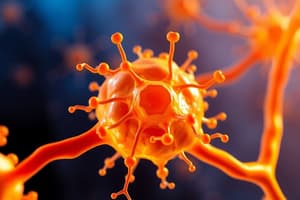Podcast
Questions and Answers
What type of hormone is epinephrine classified as?
What type of hormone is epinephrine classified as?
- Peptide/protein
- Lipid soluble
- Intracellular
- Water-soluble (correct)
Where are the receptors for water-soluble hormones located?
Where are the receptors for water-soluble hormones located?
- In the cell nucleus
- On the intracellular membranes
- In the cytoplasm
- On the cell surface or plasma membrane (correct)
Which second messenger is associated primarily with ADH's action?
Which second messenger is associated primarily with ADH's action?
- Inositol-triphosphate (IP3)
- Diacylglycerol (DAG)
- cAMP (cyclic adenosine monophosphate) (correct)
- Tyrosine kinase
What is the primary mechanism of action for lipid-soluble hormones?
What is the primary mechanism of action for lipid-soluble hormones?
Which one of the following hormones utilizes the second messenger inositol-triphosphate (IP3)?
Which one of the following hormones utilizes the second messenger inositol-triphosphate (IP3)?
Which class of hormone typically binds to receptors on the cell surface?
Which class of hormone typically binds to receptors on the cell surface?
What outcome occurs when a second messenger is activated in a target cell?
What outcome occurs when a second messenger is activated in a target cell?
Which hormone is secreted from the pituitary and acts through tyrosine kinase?
Which hormone is secreted from the pituitary and acts through tyrosine kinase?
What is a characteristic symptom of prolactin excess?
What is a characteristic symptom of prolactin excess?
How does ACTH influence the adrenal cortex?
How does ACTH influence the adrenal cortex?
What is the half-life of adrenocorticotrophic hormone (ACTH)?
What is the half-life of adrenocorticotrophic hormone (ACTH)?
Which hormone primarily regulates the release of ACTH?
Which hormone primarily regulates the release of ACTH?
What is a possible cause of excess ACTH production?
What is a possible cause of excess ACTH production?
Which factor does NOT stimulate ACTH release?
Which factor does NOT stimulate ACTH release?
What effect does corticotropin releasing hormone have on the pituitary?
What effect does corticotropin releasing hormone have on the pituitary?
What effect does ACTH have on skin pigmentation?
What effect does ACTH have on skin pigmentation?
What is NOT a symptom of prolactin excess?
What is NOT a symptom of prolactin excess?
Which hormone released by the anterior lobe of the pituitary stimulates the release of thyroid-stimulating hormone?
Which hormone released by the anterior lobe of the pituitary stimulates the release of thyroid-stimulating hormone?
What is the primary role of somatostatin in relation to the pituitary gland?
What is the primary role of somatostatin in relation to the pituitary gland?
What type of connection exists between the hypothalamus and the posterior pituitary?
What type of connection exists between the hypothalamus and the posterior pituitary?
Which of the following hormones is stored and released by the posterior pituitary?
Which of the following hormones is stored and released by the posterior pituitary?
What effect does prolactin inhibiting hormone have on the pituitary?
What effect does prolactin inhibiting hormone have on the pituitary?
Which hormone is responsible for stimulating both luteinizing hormone and follicle-stimulating hormone secretion?
Which hormone is responsible for stimulating both luteinizing hormone and follicle-stimulating hormone secretion?
What is the primary difference between the anterior and posterior lobes of the pituitary gland?
What is the primary difference between the anterior and posterior lobes of the pituitary gland?
Which hormone accounts for about 95 percent of all glucocorticoid activity?
Which hormone accounts for about 95 percent of all glucocorticoid activity?
What is the primary role of cortisol in carbohydrate metabolism?
What is the primary role of cortisol in carbohydrate metabolism?
What effect does cortisol have on protein stores in the body?
What effect does cortisol have on protein stores in the body?
What is the primary effect of cortisol on fat metabolism?
What is the primary effect of cortisol on fat metabolism?
Which enzyme converts cortisol to cortisone in the body?
Which enzyme converts cortisol to cortisone in the body?
What percentage of cortisol in plasma typically binds to cortisol-binding globulin?
What percentage of cortisol in plasma typically binds to cortisol-binding globulin?
Which of the following hormones requires cortisol for its calorigenic effects?
Which of the following hormones requires cortisol for its calorigenic effects?
What is the half-life of cortisol?
What is the half-life of cortisol?
Which condition is associated with increased secretion of angiotensinogen?
Which condition is associated with increased secretion of angiotensinogen?
What is a key characteristic of Addison's disease?
What is a key characteristic of Addison's disease?
What is the primary cause of primary adrenal insufficiency?
What is the primary cause of primary adrenal insufficiency?
What symptom is a result of cortisol deficiency?
What symptom is a result of cortisol deficiency?
Which hormone accounts for about 90 percent of all mineralocorticoid activity?
Which hormone accounts for about 90 percent of all mineralocorticoid activity?
Which of the following is a symptom of adrenal insufficiency?
Which of the following is a symptom of adrenal insufficiency?
What change in the central nervous system can occur due to excess cortisol?
What change in the central nervous system can occur due to excess cortisol?
What defines an Addisonian crisis?
What defines an Addisonian crisis?
Flashcards are hidden until you start studying
Study Notes
Hormones and Their Receptors
- Hormones can be classified as water-soluble or lipid-soluble.
- Water-soluble hormones (e.g., amine epinephrine, peptide/protein hormones) bind to receptors on cell surfaces.
- Lipid-soluble hormones (e.g., thyroid hormones, steroids, Vitamin D) have receptors located intracellularly.
Mechanism of Action of Hormones
- Water-soluble hormones do not cross the lipid bilayer and bind to surface receptors.
- Binding activates membrane-bound enzymes, producing second messengers (e.g., cAMP).
- Second messengers alter cell functions by activating or deactivating various enzymes.
Second Messenger Systems
- Receptors for water-soluble hormones found on the plasma membrane are coupled to second messenger systems.
- Key second messengers include:
- cAMP: involved with hormones like ADH (V2 receptor), LH, FSH, TSH, ACTH, PTH, calcitonin, glucagon, catecholamines (β receptors).
- Tyrosine Kinase: involved with oxytocin, growth hormone, prolactin, insulin, and erythropoietin.
- Inositol-triphosphate (IP3), diacylglycerol (DAG), and calcium: involved with GnRH, TRH, catecholamines (α receptors), angiotensin II, and ADH (V1 receptor).
Hypothalamic Hormones and Their Effects
- Corticotropin-releasing hormone (CRH): Stimulates ACTH secretion.
- Thyrotropin-releasing hormone (TRH): Stimulates TSH secretion.
- Growth hormone-releasing hormone (GHRH): Stimulates GH secretion.
- Somatostatin: Inhibits GH secretion.
- Gonadotropin-releasing hormone (GnRH): Stimulates LH and FSH secretion.
- Prolactin-releasing hormone (PRH): Stimulates PRL secretion.
- Prolactin-inhibiting hormone (Dopamine): Inhibits PRL secretion.
Hypothalamus and Posterior Pituitary Connection
- Neural connections exist between the hypothalamus and posterior pituitary.
- Posterior pituitary stores and releases hormones (ADH and oxytocin) produced by the hypothalamus.
- Anterior lobe synthesizes hormones that regulate other endocrine glands.
Hormones of the Pituitary Gland
- Posterior Lobe: Antidiuretic hormone (ADH) and Oxytocin.
- Anterior Lobe:
- Adrenocorticotropic hormone (ACTH)
- Growth hormone (GH)
- Thyroid-stimulating hormone (TSH)
- Follicle-stimulating hormone (FSH)
- Luteinizing hormone (LH)
- Prolactin (PRL).
Abnormalities Related to Prolactin and ACTH
- Prolactin excess due to pituitary tumors may cause:
- Infertility, amenorrhoea, galactorrhoea, impotence, loss of libido in males, and osteoporosis in females.
- ACTH:
- Peptide hormone with a half-life of 5-15 minutes.
- Regulated by CRH with negative feedback from ACTH and cortisol.
- Released in response to stress and exhibits a diurnal rhythm.
Effects of ACTH
- Trophic effect leading to increased cellularity and cortisol secretion from the adrenal cortex.
- Increases adrenal cortex responsiveness to ACTH.
- May cause skin pigmentation effects similar to MSH.
Adrenal Cortex Hormones
- Mineralocorticoids: Primarily Aldosterone.
- Glucocorticoids: Primarily Cortisol (95% of glucocorticoid activity).
- Sex Hormones: Androgens.
Cortisol Function and Disorders
- Essential for life, released in response to ACTH.
- Causes hyperglycemia and enhances protein catabolism.
- Increases fatty acid mobilization; provides permissive effects for catecholamines and glucagon.
- Deficiency leads to Addison's disease, causing hyponatremia, hypotension, hyperkalemia, and weight loss.
Aldosterone
- Main mineralocorticoid responsible for sodium retention and potassium excretion.
- Essential for life and accounts for 90% of mineralocorticoid activity.
Studying That Suits You
Use AI to generate personalized quizzes and flashcards to suit your learning preferences.



